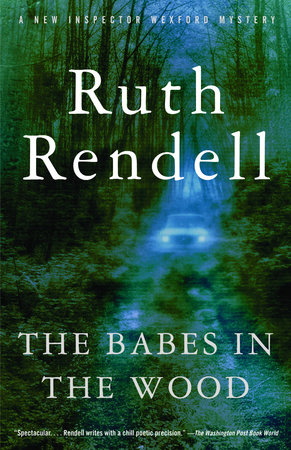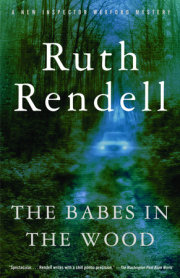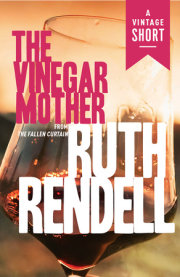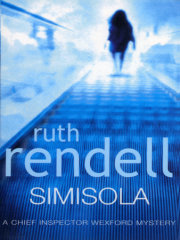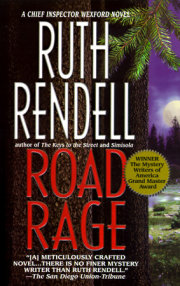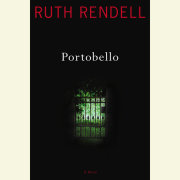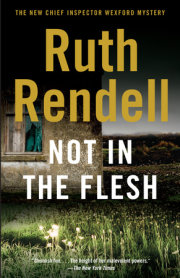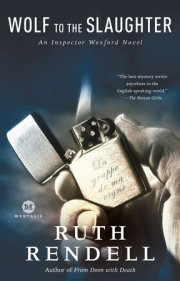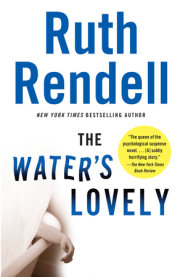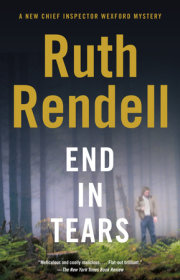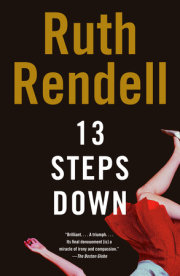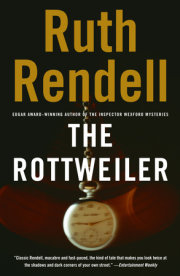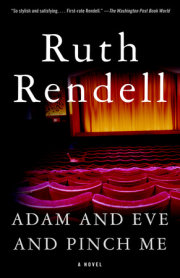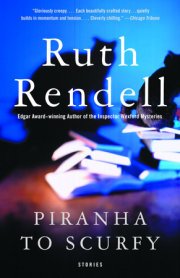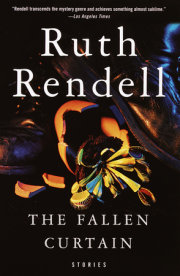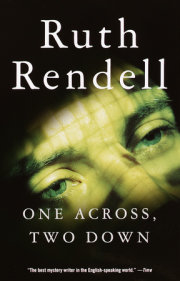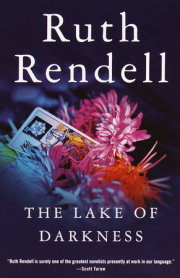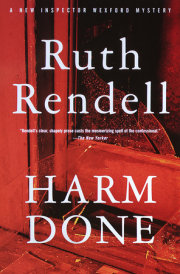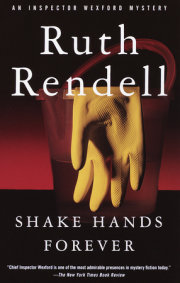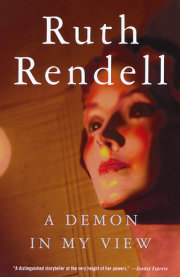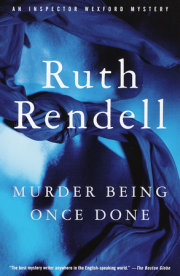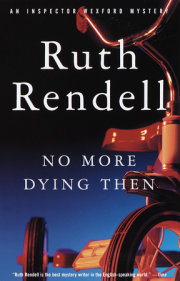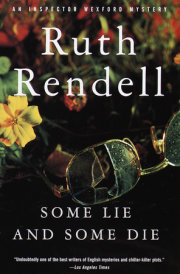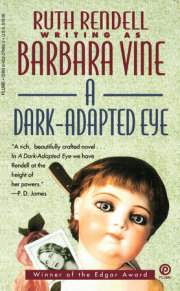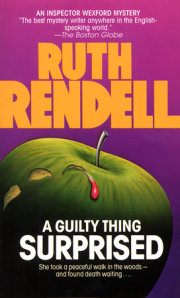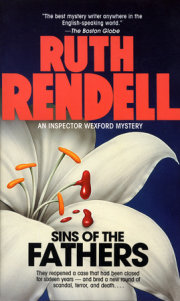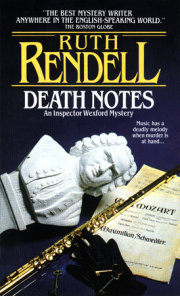Chapter 1 The Kingsbrook was not usually visible from his window. Not its course, nor its twisty meanders, nor the willows which made a double fringe along its banks. But he could see it now, or rather see what it had become, a river as wide as the Thames but flat and still, a broad lake that filled its own valley, submerging its water meadows in a smooth silver sheet. Of the few houses that stood in that valley, along a lane which had disappeared leading from a bridge which had disappeared, only their roofs and upper storeys showed above the waters. He thought of his own house, on the other side of that gently rising lake, as yet clear of the floods, only the end of his garden lapped by an encroaching tide.
It was raining. But as he had remarked to Burden some four hours before, rain was no longer news, it was tedious to remark on it. The exciting thing worthy of comment was when it wasn't raining. He picked up the phone and called his wife.
'Much the same as when you went out,' she said. 'The end of the garden's under water but it hasn't reached the mulberry tree. I don't think it's moved. That's what I'm measuring by, the mulberry tree.'
'Good thing we don't breed silkworms,' said Wexford, leaving his wife to decipher this cryptic remark.
There hadn't been anything like it in this part of Sussex in living memory -- not, at least, in his memory. In spite of a double wall of sandbags the Kingsbrook had inundated the road at the High Street bridge, flooded the Job Centre and Sainsbury's but miraculously -- so far -- spared the Olive and Dove Hotel. It was a hilly place and most of the dwellings on higher ground had escaped. Not so the High Street, Glebe Road, Queen and York Streets with their ancient shopfronts and overhanging eaves. Here the water lay a foot, two feet, in places three feet, deep. In St Peter's churchyard the tops of tombstones pierced a grey, rain-punctured lake like rocks showing above the surface of the sea. And still it rained.
According to the Environment Agency, the land in the flood plains of England and Wales was saturated, was waterlogged, so that none of this latest onslaught could drain away. There were houses in Kingsmarkham, and even more in flatter low-lying Pomfret, which had been flooded in October and were flooded again now at the end of November. Newspapers helpfully informed their readers that such 'properties' would be unsaleable, worth nothing. Their owners had left them weeks ago, gone to stay with relatives or in temporarily rented flats. The local authority had used up all the ten thousand sandbags it had ordered, scoffing at the possibility of half of them being used. Now they were all under the waters and more had been sent for but not arrived.
Wexford tried not to think about what would happen if another inch of rain fell before nightfall and the water reached and passed Dora's gauge, the mulberry. On the house side of the tree, from that point, the land sloped very gradually downwards until it came to a low wall, quite useless as a flood defence, that separated lawn from terrace and french windows. He tried not to think about it but still he pictured the water reaching and then pouring over that wall . . . Once more he reached for the phone but this time he only touched the receiver and withdrew his hand as the door opened and Burden came in.
'Still raining,' he said.
Wexford just looked at him, the kind of look you'd give something you'd found at the back of the fridge with a sell-by date of three months before.
'I've just heard a crazy thing, thought it might amuse you. You look as if you need cheering up.' He seated himself on the corner of the desk, a favourite perch. Wexford thought he was thinner than ever and looked rather as if he'd just had a facelift, total body massage and three weeks at a health farm. 'Woman phoned to say she and her husband went to Paris for the weekend, leaving their children with a - well, a teen-sitter, I suppose, got back late last night to find the lot gone and naturally she assumes they've all drowned.'
'That's amusing?'
'It's pretty bizarre, isn't it? The teenagers are fifteen and thirteen, the sitter's in her thirties, they can all swim and the house is miles above the floods.'
'Where is it?'
'Lyndhurst Drive.'
'Not far from me then. But miles above the floods. The water's slowly creeping up my garden.'
Burden put one leg across the other and swung his elegantly shod foot in negligent fashion. 'Cheer up. It's worse in the Brede Valley. Not a single house has escaped.' Wexford had a vision of buildings growing legs and running, pursued by an angry tide. 'Jim Pemberton has gone up there. Lyndhurst Drive, I mean. And he's alerted the Subaqua Task Force.'
'The
what?'
'You must have heard of it.' Burden just avoided saying 'even you'. 'It's the joint enterprise of Kingsmarkham Council and the Fire Brigade. Mostly volunteers in wetsuits.'
'If it's amusing,' said Wexford, 'that is to say, if we aren't taking it seriously, why such extreme measures?'
'No harm in being on the safe side,' said Burden comfortably.
'All right, let me get this straight. These children -- what are they, by the way? Boy and girl? And what's their name?'
'Dade. They're called Giles and Sophie Dade. I don't know the sitter's name. They can both swim. In fact, the boy's got some sort of silver medal for life-saving and the girl just missed getting into the county junior swimming team. God knows why the mother thinks they've drowned. They'd no reason to go near the floods as far as I know. Jim'll get it sorted.'
Wexford said no more. The rain had begun beating against the glass. He got up and went to the window but by the time he got there it was raining so hard that there was nothing to see, just a white fog and, near at hand, raindrops exploding on the sill. 'Where are you going to eat?' he said to Burden.
'Canteen, I suppose. I'm not going out in this.'
Pemberton came back at three to say that a couple of volunteer frogmen had begun searching for Giles and Sophie Dade but it was more a formality, an allaying of Mrs Dade's fears, than a genuine anxiety. None of the water lying in the Kingsmarkham area had reached a depth of four feet. It was over in the Brede Valley that things were more serious. A woman who couldn't swim had been drowned there a month before when she fell from the temporary walkway that had been built from one of her upper windows to the higher ground. She had tried to cling to the walkway struts but the floods came over her head and the rain and wind swept her away. Nothing like that could have happened to the Dade children, competent swimmers to whom twice the present depth of water would have presented no problems.
More a cause for concern in everyone's view was the looting currently going on from shops in the flooded High Street. A good many shopkeepers had removed their goods, clothes, books, magazines and stationery, china and glass, kitchen equipment to an upper floor and then removed themselves. Looters waded through the water by night -- some of them carrying ladders -- smashed upper windows and helped themselves to what they fancied. One thief, arrested by Detective Sergeant Vine, protested that the iron and microwave oven he had stolen were his by right. In his view, the goods were compensation for his ground-floor flat being inundated, he was sure he would get no other. Vine suspected that a bunch of teenagers, still at school, were responsible for stealing the entire CD and cassette stock from the York Audio Centre.
Wexford would have liked to check with his wife every half-hour but he controlled himself and didn't phone again until half past four. By then the heavy rain had given place to a thin relentless drizzle. The phone rang and rang, and he had almost decided she must be out when she picked up the receiver.
'I was outside. I heard it ringing but I had to get my boots off and try not to make too much mess. Rain and mud make the simplest outdoor tasks take twice as long.'
'How's the mulberry tree?'
'The water's reached it, Reg. It's sort of lapping against the trunk. Well, it was bound to, the way it's been raining. I was wondering if there was anything we could do to stop it, the water coming up, I mean, not the rain. They haven't found a way to stop that yet. I was thinking about sandbags, only the council haven't any, I phoned them and this woman said they're waiting for them to come in. Like a shop assistant, I thought.'
He laughed, though not very cheerfully. 'We can't stop the water but we can start thinking about moving our furniture upstairs.' Get Neil over to help, he nearly said, and then he remembered his son-in-law was gone out of their lives since he and Sylvia split up. Instead he told Dora he'd be home by six.
That morning he hadn't brought the car. Lately he'd been walking a lot more. The almost endless downpours stimulated his need to walk -- there was human nature for you! -- because the chance to do so in comfort and in the dry came so seldom. At first light no rain had been falling and the sky was a wet pearly blue. It was still dry at eight thirty and he'd begun to walk. Huge heavy clouds were gathering, covering up the blue and the pale, milky sun. By the time he reached the station the first drops were falling. Now he thought he would have to make it home through this wet mist that intermittently became drizzle, but when he came out of the newly installed automatic doors the rain had lifted and for the first time for a long while he felt a marked chill in the air. It
smelt drier. It smelt like a change in the weather. Better not be too optimistic, he told himself.
It was dark. Already dark as midnight. From this level, on foot, he could see nothing of the floods, only that the pavements and roadways were wet and puddles lay deep in the gutters. He crossed the High Street and began the slightly uphill walk to home. The Dades he had forgotten and wouldn't have recalled them even then but for passing the end of Kingston Gardens and reading the street name in the yellow light from a lamp. Lyndhurst Drive met it at its highest point and those living there could have looked down from their windows on to his roof and his garden. They were safe. Someone had told him that for the floods to reach such a height they would have had first to rise above the cupola on Kingsmarkham Town Hall.
Yes, the Dades were safe up there. And the chance of their children being drowned practically nil. Before he left, a message had come through from the Subaqua Task Force to say that no living people or bodies had been found. Wexford stared up the hill, wondering exactly where they lived. And then he stopped dead. What was the matter with him? Was he losing his grip on things? Those children might not have drowned but they were missing, weren't they? Their parents had come home from a weekend away and found them gone. Last night. All this nonsense about floods and drowning had obscured for him the central issue. Two children, aged fifteen and thirteen, were
missing.
He walked on fast, thinking fast. Of course, the chances were that they were back by now. They had been, according to Burden, in the care of an older person, and they were all three missing. That surely meant that the sitter, presumably a woman, had taken them somewhere. Probably she had told the mother on the previous Friday or whenever it was the parents went away, that she intended to take them on some outing and the mother had forgotten. A woman who would assume that her children had drowned, just because they weren't there and part of the town was flooded, had to be - well, to put it charitably, somewhat scatterbrained.
Dora wasn't in the house. He found her down the garden, directing the beam from a torch on to the roots of the mulberry tree. 'I don't think it's come up any more since I spoke to you at four thirty,' she said. 'Do we really have to move the furniture?'
They went indoors. 'We could shift some of the stuff we value most. Books. Favourite pictures. That console table that was your mother's. We could make a start with that and listen to the weather forecast at ten.'
He gave her a drink and poured one for himself. With the much-diluted whisky on the table beside him, he phoned Burden. The inspector said, 'I was about to call you. It just struck me. The Dade kids, they must be missing.'
'I had the same thought. Still, correction: they
may be missing. Who knows but that their sitter's just brought them back from an educational trip to Leeds Castle?'
'Which started yesterday, Reg?'
'No, you're right. Look, we have to find out. The last thing they'd do is let us know if they've turned up safe. We're strictly reserved for disasters. If these children still haven't turned up the parents, or one of them, will have to come down to the station and fill in a missing persons form and give us a bit more information. No need for you to do it. Get Karen on to it, she hasn't been exactly crushed with toil lately.'
'I'd like to call the Dades before I do anything,' Burden said.
'And ring me back, would you?'
He sat at the table and he and Dora had their dinner. The letter box flapped as the evening paper, the
Kingsmarkham Evening Courier, arrived.
'It's too bad,' Dora said. 'It's nearly eight o'clock, two hours late.'
'Understandable in the circumstances, don't you think?'
'Oh, I suppose so. I shouldn't complain. I expect the poor newsagent had to bring it himself. Surely he wouldn't let that girl go out in this.'
'Girl?'
'It's his daughter delivers the papers. Didn't you know? I suppose she does look rather like a boy in those jeans and that woolly cap.'
They kept the curtains at the french windows drawn back so that they could see if the rain started again and see too the tide of flood which had crept perhaps six feet across the lawn since last night. One of the neighbours, his garden elevated a few inches above the Wexfords', but enough, enough, had an Edwardian street lamp at the bottom of his lawn and tonight the light was on, a powerful white radiance that revealed the water lying gleaming and still. It was a shining grey colour, like a sheet of slate and the little river, somewhere down there, was lost in the broad shallow lake. It was weeks since Wexford had seen the stars and he couldn't see them now, only the bright but hazy lamplight below and a scurrying clotted mass across the sky where the rising wind agitated the clouds. Black leafless tree branches bowed and swayed. One swept the surface of the water, sending up spray like a car driving through a puddle.
'Do you want to start moving stuff now?' Dora asked when they had finished their coffee. 'Or do you want to see this?'
He shook his head, rejecting the paper which seemed to hold nothing but photographs of floods. 'We'll move the books and that cabinet. No more till we've seen the weather forecast.'
The phone rang as he was carrying the sixth and last cardboard box of books upstairs. Luckily, most of his books were already on the upper floor, in the little room they had once called his study and now was more like a mini-library. Dora took the call while he set the box down on the top stair.
'It's Mike.'
Wexford took the receiver from her. 'I've a feeling they haven't turned up.'
'No. The Subaqua Task Force want to resume the search tomorrow. They've got some idea of going under the deep water in the Brede Valley. They've not much to do and I think they like the excitement.'
'And Mr and Mrs Dade?'
'I didn't phone, Reg, I went up there,' said Burden. 'They're a funny pair. She cries.'
'She what?'
'She cries all the time. It's weird. It's pathological.'
'Is that right, doctor? And what does he do?'
'He's just rude. Oh, and he seems to be a workaholic, never an idle moment. He said he was going back to work while I was there. The kids are definitely missing. Their dad says it's all rubbish about them drowning. Why would they go near floodwater in the depths of winter? Who got hold of this ridiculous idea? His wife said she did and started crying. Jim Pemberton suggested maybe they went in the water to rescue someone else but in that case, who? The only other person to go missing is this Joanna Troy . . .'
'Who?'
'She's the friend of Mrs Dade who was spending the weekend in their house to keep an eye on the two kids. Dade's doing the missing persons forms now.' Burden's voice took on a hesitant tone. Perhaps he was remembering the heartfelt note in Wexford's voice when he expressed a wish not to get involved. 'As it happens, things are a bit more serious than they seemed at first. The Dades got home from Paris -- they came in through Gatwick -- a little while after midnight. The house was in darkness, the children's bedroom doors were shut, and the parents just went to bed without checking. Well, I suppose they wouldn't check. After all, Giles is fifteen and Sophie is thirteen. It wasn't till mid-morning that Mrs Dade found the kids weren't there. And that means not only that they've been missing since Sunday midnight but possibly since Friday evening when the parents left.'
'And this Joanna Whatever?'
'Troy. Mrs Dade's been phoning her home number all day without getting a reply and Dade went round there this afternoon but no one was there.'
'It doesn't seem to matter whether I sincerely hope or don't bother,' said Wexford wearily. 'But we'll leave it all till tomorrow.'
Burden, who could be sententious, said cheerfully that tomorrow was another day.
'You're right there, Scarlett. Tomorrow will be another day, always providing Dora and I haven't been drowned during the night. But I dare say we'll be able to get out of the bedroom windows.'
He had been watching for more rain as he was speaking and the first drops had splashed against the glass midway through his last sentence. He put the receiver back and opened the front door. It was milder out there than he could ever remember for the time of year. Even the wind was warm. It had brought with it the next downpour and the rain increased in intensity as he watched, straight-down rain like glass or steel rods crashing on to the stone flags and splashing into the waterlogged gullies between them. The down-flow pipe from the roof gutters began to pour out water like a tap turned full on and the drain, unable to cope with so great a volume, was soon lost under an eddying flood of its own.
Dora was watching the news. It ended as he came in and the weather forecast began with its typical irritating preamble: a kind of improbably glamorous creature in the guise of a water sprite and a silver lamé designer gown, sitting on top of a fountain while a concealed fan blew her hair and draperies about. The meteorologist, an altogether more normal sort of woman, pointing with a ferrule at her map, told them of flood warnings out on four new rivers and an area of low pressure rushing across the Atlantic in pursuit of the one presently affecting the United Kingdom. By morning, she said, as if this wasn't true already, heavy rain would be falling across southern England.
Wexford turned it off. He and Dora stood at the french windows looking at the water which now, as in the front garden, filled the paved area immediately outside. The rain made little waves on its surface where a twig bobbed about like a boat on a choppy sea. The trunk of the mulberry tree was half submerged and it was now a lilac bush which had become the criterion. The rising water lapped its roots. A few yards of dry land remained before the incoming tide would reach the wall. As he watched, the light at the end of the garden next door went out and the whole scene was plunged into darkness.
He went up the stairs to bed. The possibility of two young proficient swimmers being drowned no longer seemed to him so absurd. You didn't need too much imagination to fancy the whole country sinking and vanishing under this vast superfluity of water. Everyone overcome by it like shipwrecked men, their raft inadequate, their strength gone, the young and the old alike, the strong and the weak.
Copyright © 2002 by Ruth Rendell. All rights reserved. No part of this excerpt may be reproduced or reprinted without permission in writing from the publisher.

